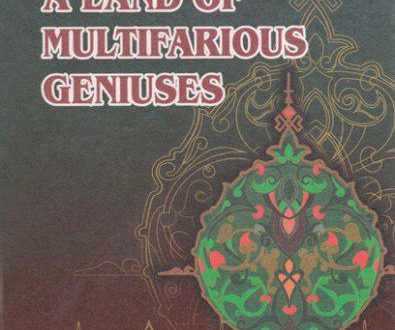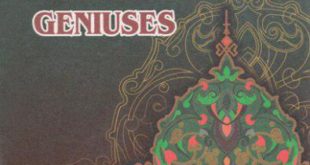Imam Abu Bakr al-Qaffal ash-Shashi occupies a special place among the estimated geniuses who grew up and earned the highest title “Imam” in the Islamic world as Imam al-Bukhari, Imam at-Termizi, Imam al-Maturidi and others. His contemporaries estimated him with the honourable title “Hazrati Imam” (His Excellency Imam). His full name was Abu Bakr Muhammad ibn Ali ibn Ismail al-Qaffal ash-Shashi but in the historical sources written in Arabic, he is honoured by adding the word “al-Kabir” (the Great) to his name. The genius was a famous craftsman as he was a well-known master in making locks (padlocks) and keys, and this peculiarity earned him a title “al-Qaffal” meaning “the master of locks and keys”. A famous historian Abu Sa’d Abdulkarim ibn Muhammad Sam’ani wrote in his book “Al-ansab” (A Book about Ancestors) the following about this matter: “Al-Qaffal is a title given to him due to his profession as a master of locks. Imam Abu Bakr ibn Muhammad ibn Ismail al-Qaffal ash-Shashi was from Shash and was famous for his skill in making locks and keys. He was a leading figure of his time as an imam and incomparable expert in the fields of law, hadith, style and linguistics. His name was known both in the East and the West”.
In the book written by a historian Shamsuddin az-Zahabi, Qaffal ash-Shashi was acknowledged as scientist not only in Maveraunnahr but also in Khorasan: “Among the scholars of Khorasan Imam Abu Bakr Muhammad ibn Ali ibn Ismail ash-Shashi ash-Shafi’i was genius and imam in the science of kalam, style and law. He was also known with the title “Katta Qaffal” (A great master of locks and keys). He was an imam of his time and created a number of books”.
According to the opinion of Sheikh Muhyiddin an-Navavi, if the name “Qaffal ash-Shashi” is mentioned, we must understand the great Imam we know — Imam Abu Bakr al-Qaffal ash-Shashi (an older Shashi). His name is often mentioned in the works dealing with tafsir, hadith, style and kalam.
If the Qaffal Marvazi is mentioned, we must understand another scientist (a little Qaffal), an expert in law who lived after Qaffal ash-Shashi. We meet his name only in the books about fiqh (law).
Tajiddin as-Subki characterizes our countryman in the following lines: “He was a great man, one of the greatest imams of his time and a kind man who had a wide range of knowledge. Abu Bakr al-Qaffal ash-Shashi was a leading imam in law, tafsir, hadith, kalam, style, lexicography and poetry. He defended most of the sciences and used to investigate and analyze the things he had discovered”.
The historians of the Middle Ages made a special stress on the authority, status and scientific potential of Imam Abu Bakr al-Qaffal ash-Shashi in the Islamic world. One of them Ibn Khallikan wrote in his book “Vafayat al-a’yan”: “Abu Bakr al-Qaffal ash-Shashi was one of the greatest imams of his time. He was incomparable among the scholars of the Shafi’i order in Maveraunnahr in the sciences as law, hadith, style, linguistics and poetry. He visited such countries as Khorasan, Hijaz (Mecca), Iraq and Syria, and his fame is widely known in these countries”.
An outstanding historian of his time Abu Sa’d Abdulkarim ibn Muhammad Sam’ani describes Tashkent in his famous book “An-Ansab” (The Book about Ancestors) as such: “It is a city on the other bank of the river Sayhun on the borderland with Turks and called as “Shash”. A number of famous imams were educated in this city”. Providing some information about imams of the city of Shash, the author writes about Qaffal ash-Shashi the following lines: “Imam Abu Bakr Muhammad ibn Ali ibn Ismail al-Qaffal ash-Shashi was a great expert in tafsir, hadith, law and linguistics, and he had no equal in these fields to be compared. …there was a saying about Qaffal ash-Shashi: “Abu Bakr is a lawyer and master of locks and keys. He opens the locks easily which are difficult to open, especially the locks of law””.
Imam Abu Bakr al-Qaffal ash-Shashi was born in 291/904 in Shash and received the primary education in his motherland and later in the other famous centres of education in Maveraunnahr. He visited such centres of science and enlightenment as Samarkand, Bukhara, Termez and familiarised himself with the legacy of his countrymen as Imam al-Bukhari and Imam at-Termizi and studied the Hadiths of Prophet Muhammad (saas).
Alongside with it, Imam Abu Bakr al-Qaffal ash-Shashi visited Khorasan and attended the lessons of such famous scholars as Muhammad ibn Is’haq ibn Khuzayma, Muhammad ibn Is’haq as-Sarraj and Umar ibn Muhammad ibn Bukhayr as-Samarqandi. When he was in Iraq, he used to attend the lessons of such famous specialist in the Islamic sciences as Muhammad ibn Jarir Tabari, Musa ibn Abdulhamid and Abdullah ibn Muhammad aJ-Baghavi ibn Abu Davud ibn Saghid. When he visited Kufa, he listened the lectures of Abdullah ibn Zaydan and Ali ibn Abbas al-Muqani’i, in Syria he used to attend the lessons of Abulhamiym, and in Jazira (in Arabic Peninsula) he attended the lectures of Abu-Aruba al-Harrani, etc. on the science of Hadiths.
In his work titled as “Siyar a’lam an-nubala” (Descriptions of Great Geniuses), the author Shamsuddin az-Zahabi cites the following lines: “Hakim says: In Maveraunnahr a scholar who visited other countries most of all in accord with the demands of the science of style and claims of Hadiths is Imam Abu Bakr al-Qaffal ash-Shashi”.
In its turn, some scholars and followers used to attend the lessons delivered by Imam Abu Bakr al-Qaffal ash-Shashi. The book titled as “Tadvin fi akhbari Qazvin” (Writings about the Information of Qazvin) provides some interesting facts about this matter. According to them, after 350/962 Abu Bakr al-Qaffal ash-Shashi visited the city of Qazvin and the scholars as Abu Mansur al-Qattan, etc. attended his lectures and took some notes on Hadiths and other information.
Different sources contain Hadiths taken from Qaffal ash-Shashi. For instance, one of the authors Abu Hatam Muhammad ibn Ab-dulvahid took some Hadiths from Imam Abu Bakr al-Qaffal ash-Shashi and those Hadiths were borrowed from him by Abu Ali Hasan ibn Sahib Shashi, from him they were borrowed by Yunus ibn Ibrahim Adani, from him they were borrowed by Abdulhamid ibn Salih, from him they were borrowed by Salih ibn Abduh’abbar al-Khazrami, from him they were borrowed by Muhammad ibn Abdurrahman Baylamani, and he received them from his father, his father copied them from Ibn Umar and Ibn Umar received them from Prophet Muhammad (saas). The Messenger of Allah kindly said: “Study and learn poetry because it contains useful aphorisms and fables”.
In his book “Tuhfat al-Ahvazi” (A Present from Ahvazi), Abdula’la Muhammad Abdurrahman ibn Abdurahim al-Mubarakfuri (1283-1353) writes the following lines about Abu Bakr Qaffal ash-Shashi: “Qazi Husain and Abu Said Mutavalli said: “Sometimes people greet each other when getting parted. The answer to this greeting is by will but not necessary, because people greet each other when they meet and when saying good-bye. However, Abu Bakr Qaffal ash-Shashi refused such a supposition and stressed that greeting each other when people meet and get parted was necessary. I o receive the greetings of a partner while getting parted is as necessary as it is necessary in meeting each other. It is correct and is a must”.
 Imom Buxoriy xalqaro ilmiy-tadqiqot markazi bukhari.uz
Imom Buxoriy xalqaro ilmiy-tadqiqot markazi bukhari.uz










